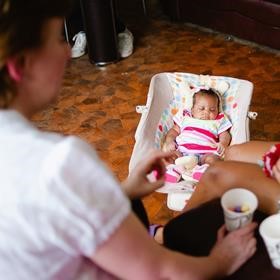Working together to create opportunities to really drive forward the changes we need to implement, so we can improve outcomes for children and families.
Sheena Carr, Deputy Head, Children, Young People & Families and Wendy Nicholson, Deputy Chief Nurse - Children, young people & families & Deputy Head of World Health Organisation Collaborating Centre for Public Health Nursing and Midwifery - Public Health England.
We know that the early years are a critical opportunity for building healthy, resilient children, with positive early experiences shaping outcomes throughout the life-course and contributing to a healthy, thriving society. While there have been improvements in child outcomes over the years, there remain persistent inequalities that start early in life. However, inequality is not inevitable, and we are continuing to strive to ensure that every child has the best start in life.
There is considerable cross Government interest in early years, including the Inter-Ministerial Group which is focusing on 0-2 years and listening to evidence from key experts, learning from what works from other programmes or initiatives. In addition, the recent Health and Social Care Committee Report (HSCC) on the First 1000 days highlighted the importance of improving support and services for children, parents and families as well as asking the Government to produce a long-term, cross-Government strategy for the first 1000 days of life.
The Healthy Child Programme (HCP) has been fundamental in framing the support required to keep children healthy, but it is now 10 years old and both the Inter-Ministerial Group and HSCC have advocated for a refreshed HCP. This will be a huge opportunity to embed new evidence and to consider the current landscape locally, regionally and nationally.
In modernising the HCP, we will extend the age reach from preconception to 24 beginning with the priorities in the PHE Business Plan 19/20 to:
- Refresh the health visitor service offer – the 4-5-6 model
- Publish a preconception and maternity pathway to reduce risk and improve wellbeing,
- Publish a speech, language and communication pathway to improve outcomes for children and reduce inequality in school readiness
A modernised HCP needs to provide support to all parents, identifying where extra help is needed and providing solutions through evidence based programmes, including digital/technological approaches. We need to maintain the 5 universal contacts while responding to new evidence/specific need as required, moving towards a ‘personalised HCP’ that uses new information systems to model effectiveness and specificity of interventions.
Building on the current HCP, we want to ensure continued focus on oral health and programmes such as supervised toothbrushing; sustaining high levels of immunisation and management of minor illness and reduction of unintentional injury thus reducing demand on NHS.
We see the HCP as the overarching vehicle to join up all the prevention activities for 0-25s which supports identification of need, early intervention and effective referral to prevent and mitigate vulnerability/adversity.
Health visitors as the lead professional for the Healthy Child Programme (0-5) are central to the new and ongoing developments. We will continue to build on their expertise and skill in delivering high quality evidence-based public health interventions.
So, it is an exciting time and there are opportunities ahead of us. Public Health England, through the Best Start in Life programme of work is committed to ensuring children are ready to learn at 2 and ready for school at five; for PHE this means ensuring we have the best evidence to support children and families; practitioners, including health visitors, have evidence to underpin their practice and commissioners have tools and guidance to support their decision making.
We do have further opportunities. We recently announced that the FNP National Unit will be moving into PHE in 2020 and we look forward to welcoming the team. This is a real opportunity and timely, we know FNP remains an important programme for early years and it was highlighted as an example of good practice in the Health and Social Care Committee report. The transfer into PHE provides exciting opportunities to capitalise on the experience, evidence and knowledge from the FNP team and to strengthen the work across the PHE Nursing, Maternity and Early Years and Health Improvement Directorates. Working together on shared agendas and building on the immense expertise across the 3 teams will be incredible and creates opportunities to really drive forward the changes we need to implement, so we can improve outcomes for children and families.
